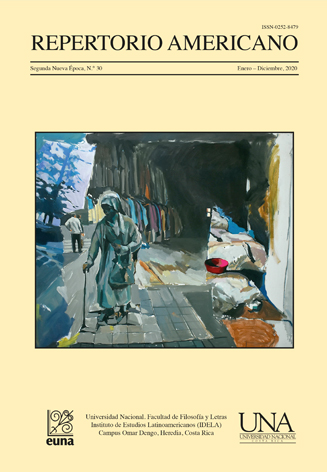R E P E R T O R I O |
| A M E R I C A N O |
Segunda nueva época N.° 30, Enero-Diciembre, 2020 | ISSN: 0252-8479 / EISSN: 2215-6143 | |
Native American Identity Contradictions in Silko’s Ceremony and The Business of Fancydancing
Contradicciones sobre la identidad nativa americana en la novela Ceremony y la película The Business of Fancydancing de Silko
Jose Fabián Elizondo González
Escuela de Lenguas Modernas
Universidad de Costa Rica
|
Abstract This paper presents a comparative analysis of the protagonists of both the book Ceremony and the movie The Business of Fancydancing. Through the concept of “blood memory,” as proposed by Allen (94), these two characters reflect multiple shortcomings on either embracing or rejecting their cultural heritage. Keywords: native Americans, blood memory, cultural analysis, queer movies Resumen Este artículo presenta un análisis comparativo de los protagonistas tanto del libro Ceremony como de la película The Business of Fancydancing. Por medio del concepto de “memoria de sangre”, según lo propuesto por Allen (94), estos dos personajes reflejan múltiples deficiencias en aceptar o rechazar su patrimonio cultural. Palabras clave: nativos americanos, memoria de sangre, análisis cultural, películas queer |
Whenever it comes to cultural preservation, the question of ‘to what extent should one represent this culture’ arises. Thus, an overarching question of self-definition is poised. From many forms of interactions, since early ages, many individuals learn that what should matter the most as a successful person is the respect for oneself and one’s background, which inevitably leads to an overarching definition of one’s existence. This recurrent theme turns out to be an issue when the cultural and social baggage collide and poses a painful and exhausting dichotomy in individuals. It is in the middle of this situation that the concept of “blood memory” materializes and ghosts cultures like the one of the American Indians. This latter theory expressed by Chadwick Allen poses the intricate notion that there are variables in every man’s perception that are based on his/her genes (Allen 94). By stating this, one could possibly argue that there is a reality that makes people belong to a desired or undesirable past which each person bears in his/her blood (Momaday in Allen 105). Therefore, the consequent question is whether or not these individuals should follow those doctrines that tie them to their blood, or if they actually are able to leave aside those cultural assumptions about themselves and start as a new person. Consequently, under the light of Allen’s “blood memory” and the quest for self-definition, characters in both Ceremony and The Business of Fancydancing suffer from the eternal quest of self-definition: they want to know who they are, where they belong to, and how they should belong to a certain society, all with the aim of reconciling their Indian past with their uncertain present. In both the novel and the film, two different scenarios exhibit the dissident cases of acceptance and rejection of the established assumptions about blood memory, which end up in burdens that could either turn into a legacy or a curse.
In the first set of different directions and moral cores, Tayo from Ceremony and Aristotle from The Business of Fancydancing can be grouped together. To begin with, Tayo is left to live with his Aunt Thelma, for his mother—Laura—becomes unable to provide for him, inasmuch as her life of licentiousness impairs her from exercising any responsibility over herself, let alone over her son. As a consequence, this unacceptable behavior brings shame and disgrace to the family, which makes Tayo look as the unwanted child (Silko 60). For these reasons, Thelma works really hard to make sure that he spends his childhood days isolated and rejected, for he should not be part of her Christian house where the lack of values of Tayo’s mother are frowned upon. The negative response is even more pronounced due to the protagonist’s mixed blood condition. When Grandma tells Laura to get a medicine man for Tayo, she replies, “Someone will say it’s not right. They’ll say, ‘Don’t do it. He’s not full blood anyway’” (Silko 30). It goes without saying that Tayo’s bringing up is not more than an inescapable alienation from those both near and far from him for reasons that are completely out of his control. With extremely few exceptions, Tayo does not seem to have someone who would be willing to share with him all he has been hindered from throughout the years. However, he tries to embrace all learned from Josiah—whom he does not have any kind of blood tie with—and becomes part of the family, even just for moments. Their relationship springs purely out of affection, transcending the actual blood bond with Aunt Thelma. For this reason, he still makes an effort in believing and working the way Josiah does. Namely, Tayo—as most Silko’s characters—believes that “the self, land, and community are united […] internalized through story” (Jaskoski 3); hence, Tayo’s tie with Josiah makes him reject ideas of a brighter future because he wants to help Josiah at the farm, embracing a traditional path for him as his mentor, an Indian. By following Josiah’s voice, even after his death, Tayo finds himself in many situations where his background clashes with the whites’ world, making him doubt about the veracity and actual practicality of each side, choosing in most of them what Josiah would have said or done if he were alive. Through the scope of traditionalism, Tayo has difficulties trying to understand Rocky’s desires to leave the reservation once and for all, seeing that there is a world besides his blue mountains, and that Josiah’s teachings were not definite and final, which makes the reader see that Tayo—willingly aware— supposedly embraces his blood memory, notwithstanding his socially undesirable preconditions.
On some equal terms, the character Aristotle from The Business of Fancydancing shares with Tayo the experience of a childhood in the reservation, but faces many uncomfortable, inauspicious experiences later on in life, which makes him choose to go back to the reservation for mere conformism and anger. The alleged embrace of this character’s blood memory comes as the result of a series of failures and dejected events, which leave him no way out. The unsuccessful attempt at incorporating into the white world traumatizes him, and this in turn takes him to the one and only safe place: the reservation, since [Indians were] “ill-prepared for city life, especially full-bloods, illiterates (Olson in Shanley 3). As examples of his not fitting in the mainstream society, one can see he is treated as a cheater in his high school exam to go to college, and when he is finally admitted, he drops out of it. When asked about this, his only reply is a war cry. Additionally, when lying in bed with his boyfriend, the latter is reading a poem for him, and his reaction is to sing some tribal chant, representing the difference between the written quality of the modern western world and the orality of some Native American languages. This simple way of communicating their affection places them in opposite worlds, which makes Aristotle finally decide to quit trying to belong to a white man society, and ironically, this is actually what his boyfriend purposefully and desirably does. After moving back to the reservation, Aristotle does very little besides doing drugs and following Mouse around. Hence, he is not relatively portrayed as an individual who is comparatively productive or necessary, just one more man in the reservation who decides to come back. Consequently, one could actually affirm that Aristotle is living at the reservation under these circumstances of his failure, for there is nowhere else he could possibly go. Thus, accepting blood memory—like in Tayo’s case—is not a concept that applies here at all, since the protagonist seems to be only taking advantage of the commodities at the reach of his hand, instead of embracing millenary teachings and customs willingly.
The contradiction begins when returning to the reservation then does not necessarily imply the journey of the wise Indian, who needs to go outside, see the world, and later come back reformed and loving his land; sometimes it simply entails the inability of individuals to adapt, and the emotional regression and lack of tools to develop the disposition necessary to survive—like in Aristotle’s case. Tayo, on the one hand, comes back from his journey and is more optimistic than he ever was, for he has found his place in his town and in his life right there at the farm. On the other hand, Aristotle comes back to the reservation angrier than he ever was, for having failed at school, lost a boyfriend, and being in contact with whites, whom he apparently does not tolerate. The fact that he randomly attacks a white man that needs some help in the street reveals all these grudges toward the society who makes him full of hatred. This journey is more of a failed journey, where the hero becomes a fallen hero, and his quest ends in nothing else but misery and uncertainty. Similarly, Tayo is not a grand hero, inasmuch as he loses his mind, and he is practically considered insane by his doctors and friends. The unreliability of this protagonist allows the reader to conclude that he comes back home, for there is not a place that would take him due to his mental condition, which makes his return imminent and finite. Consequently, neither Tayo nor Aristotle seem to embrace their reservation life and blood memory out of willingness and whim; they have accepted their dysfunctional condition outside of it and going back is no more than an act of surrender.
These two works emphasize that the act of accepting or rejecting one’s blood memory generally depends on the development of one’s failures or successes but never in an uninterested manner. Both Tayo and Aristotle search for their past as their futures seem already entirely shattered, considering themselves as part of their culture, for there is no other place that would take them for who they are. In defense of blood memory, the portrayals of different characters in this book and film create the sense that blood memory could function more than the simple attachment to the roots and culture, but it serves as a scapegoat in the larger picture.
Allen, Chadwick. “Blood (and) Memory.” American Literature, Vol. 71. No.1 (Mar., 1999), pp. 93-116.
Jaskoski, Helen. Leslie Marmon Silko: A Study of the Short Fiction. New York: Twayne
Publishers, 1998.
Shanley, Katheryn W. “James Welch: identity, circumstance, and chance”. The Cambridge
Companion to Native American Literature. Ed. Joy Porter and Kenneth Roemer. Cambridge: Cambridge University Press, 2005.
Silko, Leslie Marmon. Ceremony. New York: Penguin Group, 2006.
The Business of Fancydancing. Dir. Sherman Alexie. Perf. Evan Adams. Falls Apart Productions, 2002.




